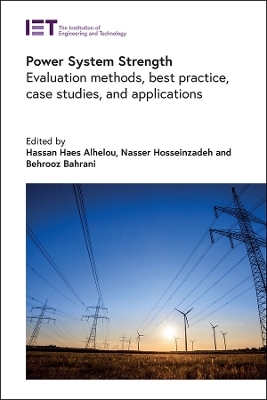
Power System Strength
Institution of Engineering and Technology (Verlag)
978-1-83953-807-0 (ISBN)
Power systems need to incorporate rising shares of intermittent renewables. The penetration levels of renewable energy sources, inverter-based resources and inverter-based loads have grown, which has negative impacts on the stability and system strength of existing power systems.
System strength describes the ability to manage fluctuations in supply or demand while maintaining the voltage. Metrics for the system strength and the hosting capacity are needed, as well as ways to improve the strength, for example by managing the loads, electric vehicles, generation and grid-forming inverters.
This book is intended to enable researchers to advance the movement towards smart grids and clean energy systems by providing solutions to improve system strength. Case studies underpin the technologies presented.
Chapters cover power system strength assessment, voltage sensitivity-based metrics, high penetration of inverter-based resources and their impacts, dynamic model reduction of power networks, effects of power system strength on transmission capacity, control approaches for system strength, impact of renewables on voltage stability, and smart devices-based strategies for planning and operation.
Power System Strength: Evaluation methods, best practice, case studies, and applications is a comprehensive book on power system strength in emerging power grids with high penetration of renewable energy systems, for researchers in university, academia and experts at utilities and power system operators.
Hassan Haes Alhelou is with the Department of Electrical and Computer Systems Engineering of Monash University, Australia. He is a senior IEEE member, was listed in the Top 2% of scientists in the world by the Stanford University database in 2022, and the recipient of the Outstanding Reviewer Award from many journals, e.g., Applied Energy. He has participated in 15 international industrial projects globally. His research interests include power system dynamics and stability, operation and control, dynamic state estimation, and frequency control. Nasser Hosseinzadeh is the director of the Centre for Smart Power and Energy Research of Deakin University, Australia. With a PhD from Victoria University, Australia, prior positions include head of the Department of Systems at CQ University Australia, and of the Department of Electrical and Computer Engineering, Sultan Qaboos University, Oman. His main research focus is stability assessment of the power grid as impacted by inverter-based resources (IBRs). He is particularly working on the impact of IBRs on the power system strength, and the impact of a weak system on the operation of IBRs. He serves as a reviewer for several IEEE journals. Behrooz Bahrani is a senior lecturer at the Department of Electrical and Computer Systems Engineering at Monash University, Australia. He earned his PhD at the Ecole Polytechnique Federale de Lausanne (EPFL). He was a postdoctoral fellow at several institutions including EPFL, Purdue University, USA, Georgia Institute of Technology, USA, and Technical University of Munich, Germany. His research interests include control of power electronics systems, applications of power electronics in power and traction systems, and grid integration.
Chapter 1: Power system strength assessment with high penetration of inverter-based resources - a conceptual approach
Chapter 2: Power system strength assessment with inverter-based resources: challenges and solutions
Chapter 3: Voltage sensitivity-based system strength metric
Chapter 4: Dynamic model reduction of power networks for fast assessment of power system strength - part 1: classical techniques
Chapter 5: Dynamic model reduction of IBRs-rich power networks for fast assessment of power system strength - part 2: data-driven techniques
Chapter 6: Inverter-based resources and their impact on power system inertia and system strength
Chapter 7: The effect of power system strength on the calculation of available transmission capacity
Chapter 8: Advanced control approach for providing system strength
Chapter 9: The impact of renewable energy on voltage stability and fault level
Chapter 10: New smart devices-based strategies for optimal planning and operation of active electric distribution networks
| Erscheinungsdatum | 12.12.2023 |
|---|---|
| Reihe/Serie | Energy Engineering |
| Verlagsort | Stevenage |
| Sprache | englisch |
| Maße | 156 x 234 mm |
| Themenwelt | Technik ► Elektrotechnik / Energietechnik |
| ISBN-10 | 1-83953-807-4 / 1839538074 |
| ISBN-13 | 978-1-83953-807-0 / 9781839538070 |
| Zustand | Neuware |
| Informationen gemäß Produktsicherheitsverordnung (GPSR) | |
| Haben Sie eine Frage zum Produkt? |
aus dem Bereich


